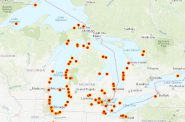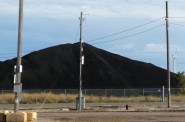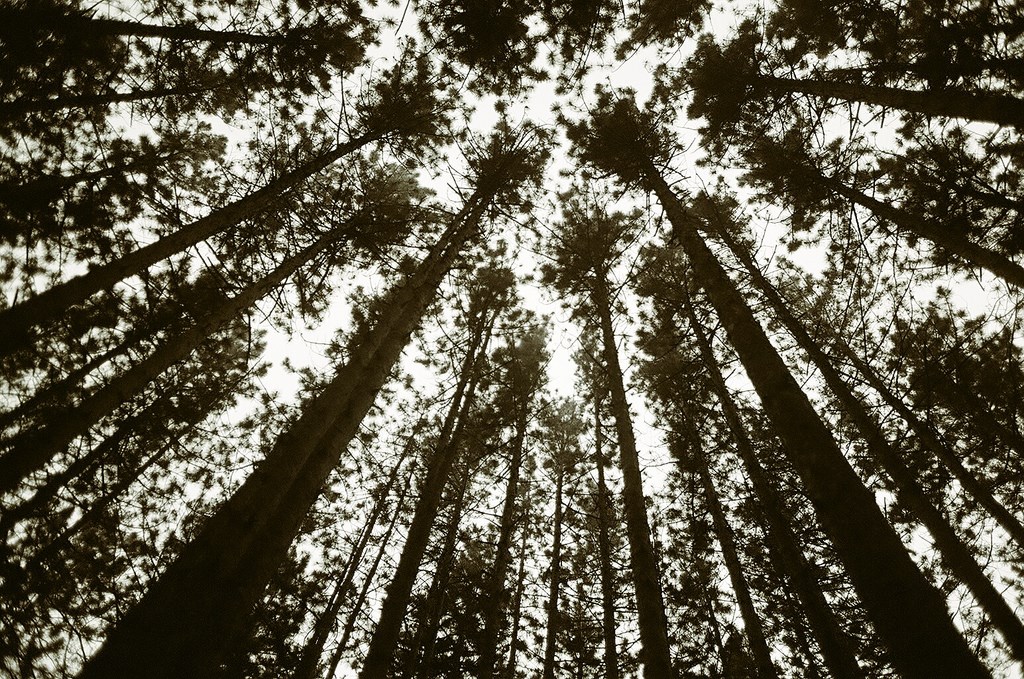Global Warming Hits Great Lakes Forests
Warmer weather, more drought will impact ecosystem, huge forestry industry.
Great Lakes forests will get warmer and suffer more frequent short-term droughts, scientists say.
“We know climate change is going to really stress these systems in ways they haven’t been stressed in the last several thousand years,” said Stephen Handler, a climate change specialist with the U.S. Forest Service.
How trees will respond to such different growing conditions is unknown. But experts say they can’t wait to find out.
“You don’t wait until the car has already gone over the cliff,” Handler said. “You hit the brakes when you can. You steer and find a better way around the cliff.”
Handler is among the researchers who are taking the wheel. They are already figuring out what forest managers can do to mitigate potentially devastating impacts.
The stakes are high. The Great Lakes forestry industry is worth several billion dollars, and forests are staple ecosystems in the region. Many wildlife and plant species depend on forest stability. Plus, forests are a part of the regional culture.
Organizations like the Northern Institute for Applied Climate Science (NIACS) and the U.S. Forest Service are encouraging early action, Handler said.
Brian Palik, a research ecologist with the U.S. Forest Service, is part of a team of researchers conducting a nationwide study testing approaches to climate change adaptation for trees, called Adaptive Silviculture for Climate Change (ASCC).
The approaches are as diverse as the tree species.
“The habitat suitability models that look at trees suggest that there’s a component of trees in that forest type that are actually going to be OK with the projections for climate change,” Palik said. White pine and red oak are species that might do better. “But things like red pine, the iconic tree species of that forest, and paper birch and white spruce are not projected to do well.”
Palik’s team is focusing on Great Lakes red pine forests, which also include a large mixture of other species. ASCC is monitoring the trees’ growth, health and survival, among other things. The approaches respond to three main traits: resistance, resilience and transition.
Resistance refers to a species’ ability to remain stable and productive in the face of drought. Resilience is a tree’s ability to return to normal productivity after experiencing some change.Transition refers to actions encouraging ecosystems to adapt to changing conditions.
For red pine forests, studies show that removing some trees can improve the remaining trees’ resistance to drought.
“There appears to be more soil moisture availability to those remaining trees when you do that,” Palik said.
A recent study proposes improving resistance by mixing leaf-shedding trees into pine forests.
The study investigated forests with white pine, red pine, trembling aspen and white birch. It looked at how numbers of different species and particular combinations of different species affect forest stability and found, contrary to a long-standing ecological hypothesis, that higher species diversity in forests did not contribute to forest stability.
“It’s actually the composition of species in the forest that has an effect on some aspects of stability,” said Jeffrey Dech, co-author of the study and an associate professor of biology at Nipissing University in North Bay, Ontario. The study found that red pines were more productive when paired with broadleaf trees like trembling aspen and white birch.
That discovery might be useful for forest managers planning planting cycles in the long run. But more research is needed to support these findings, Dech said.
“There’s more work to be done,” he said.
The time to be doing that work is now, Palik said.
“Even though we don’t know what exactly is going to happen in the future with climate change, it’s time to start looking at approaches that help us adapt these forests to the unexpected,” he said.
This story was originally published by Great Lakes Echo.
Great Lakes Echo
-
Tracking Balloon Debris in Great Lakes
 Dec 3rd, 2019 by Tasia Bass Cont
Dec 3rd, 2019 by Tasia Bass Cont
-
Coal Ash Pollutes Midwest States
 Jun 5th, 2019 by Andrew Blok
Jun 5th, 2019 by Andrew Blok
-
Extreme Changes Forecast for Great Lakes
 May 21st, 2019 by Cassidy Hough
May 21st, 2019 by Cassidy Hough






















“President-Elect Donald J. Trump 725 Fifth Avenue
New York, NY 10022
Dear President Elect Trump,
As you prepare to take office in January, you will face many challenges. One of the most serious is the very real threat posed by global warming. As faculty members and researchers from Departments of Physics and Astronomy around the United States, we urge you to address this issue as a most urgent priority.
Our appeal to you rests on three central points: First, climate scientists have established beyond any reasonable doubt that our planet is warmer now than it has been since 1850, when reliable records begin. The atmosphere and oceans are warmer, snow cover has decreased, glaciers have retreated, polar ice sheets are losing mass, arctic sea ice is vanishing and the sea level is rising.
Second, the scientific community is highly confident that human use of fossil fuels is the dominant driver of this warming. Burning fuels releases carbon dioxide and rising global carbon dioxide levels promote global warming. Carbon dioxide levels are now higher than at any time in the past 800,000 years. Of all possible agents, only this rise in carbon dioxide and other greenhouse gases can account for the observed warming. Natural variability in the climate system, changes in solar intensity, volcanic eruptions and many other possible mechanisms have been investigated and have been ruled out as the primary cause of the warming. These statements reflect a true consensus among climate scientists. There is no meaningful dissent.
Lastly, climate change is an economic and existential threat to our country and to human and animal life on our planet. If we do not replace fossil fuel dependence with more sustainable choices, warming will continue and we will face increased risks of severe and irreversible impacts, at home and abroad. Sea level rise is already threatening US cities and global agricultural yields are being negatively impacted. Flooding of coastal cities will lead to forced resettlement, thereby increasing the risk of violent conflict, both within the United States and around the globe. All of these effects will have enormous societal consequences, with impacts most severe on the poorest citizens.
America is a great nation because of our hard-working and creative citizenry and because of our mastery of science and technology. Addressing climate change will involve short-term costs, but will also mean new investments, new jobs and new opportunities for global leadership; things that Americans around the country will welcome.
President-elect Trump, we implore you to address the threat of climate change immediately. In so doing, you have a unique opportunity to make America an even greater country and secure a better future for all the children of the world.
Sincerely,
Physicists and Astronomers from
United States Colleges and Universities
“Red pine forest in West Michigan. Photo by Marie Orttenburger.”
That image looks like one of the Red Pine forests that were replanted many years after deforesting in Vilas County, WI. When I was a kid visiting the northwoods I wondered how these tall skinny and branchless evenly spaced pines could’ve grown in such straight, and furrowed (?) rows — looking completely different from the mixed forest across the road.
Keep up the good work if possible double your efforts. The Republicans will Keep their eyes on the prize while the left wanders the desert for the next forty years counting sun spots.
What’s the prize exactly? More droughts and no forests? Sounds like a really wonderful prize.
The prize? Exploitation of human and environmental resources for financial profit.
…except there’s no financial profit – global warming comes at a COST to the economy, not a benefit. The “prize” is financial LOSS.
America’s TV meteorologists: Symptoms of climate change are rampant, undeniable
http://www.washingtonpost.com/…
*
These graphics may help some understand whether natural forces, or human effects are primarily driving global warming.
What’s Really Warming the World?
http://www.bloomberg.com/graph…
*
Climate change: How do we know
http://climate.nasa.gov/eviden…
*
From pole to pole, twin sea ice records have scientists stunned
https://www.washingtonpost.com…
*
Watch 26 Years of Arctic Ice Disappear in Seconds
http://www.youtube.com/watch?v…
*
This Animation Lets You Watch Global Warming Heat Up Over 166 Years
http://www.slate.com/blogs/fut…
*
Climate change: How do we know
http://climate.nasa.gov/eviden…
*
Climate change could plunge tens of millions of city dwellers into poverty by 2031
http://www.businessinsider.com…
*
A Horrifying New Study Found that the Ocean is on its Way to Suffocating by 2030
http://www.theinertia.com/envi…
*
Climate change escalating so fast it is ‘beyond point of no return’
New study rewrites two decades of research and author says we are ‘beyond point of no return’
http://www.independent.co.uk/n…
*
Scientists “too frightened” to tell truth on climate impacts
http://www.climatechangenews.c…
*
Steven Chu Shares Some Sobering Climate Change Math
https://climateone.org/video/s…
*
The Earth Itself Is Now Accelerating The Demise Of The Human Species
http://www.dailykos.com/story/…
*
The Threat of Global Warming causing Near-Term Human Extinction
Temperature, carbon dioxide and methane
http://arctic-news.blogspot.co…
*
CO2 Concentration – Last 800,000 years
http://scripps.ucsd.edu/progra…
*
CO2 Concentration during the last 316-years
http://arctic-news.blogspot.co…
*
Atmospheric CO2 Rocketed to 405.6 ppm Yesterday — A Level not Seen in 15 Million Years
http://robertscribbler.com/201…
*
Conspiracy Theorists Are More Likely to Doubt Climate Science
http://www.motherjones.com/blu…
*
Climate denial activists’ parallel to anti-relativity movement of 1920s
http://www.desmogblog.com/clim…
Is there a possibility that the warmer average temperature will increase moisture content in the air (ice doesn’t evaporate as easily) and create a climate with more average rainfall? The warmer temps would certainly increase the growing season. Climate change is a terrible thing in general, but I’m wondering if the opposite could be true for great lakes forests.
Yes, most projections for our region indicate an increase in winter/spring precipitation, but also hotter, drier summers.
As far as growing season — according to EPA, “There may be higher yields of important agricultural crops for a limited period of time. However, over time, increasingly warmer temperatures and other stressors are expected to decrease yields.” (https://www.epa.gov/climate-impacts/climate-impacts-midwest)
This page has a decent summary of how our region will be affected: http://nca2014.globalchange.gov/report/regions/midwest#statement-16942